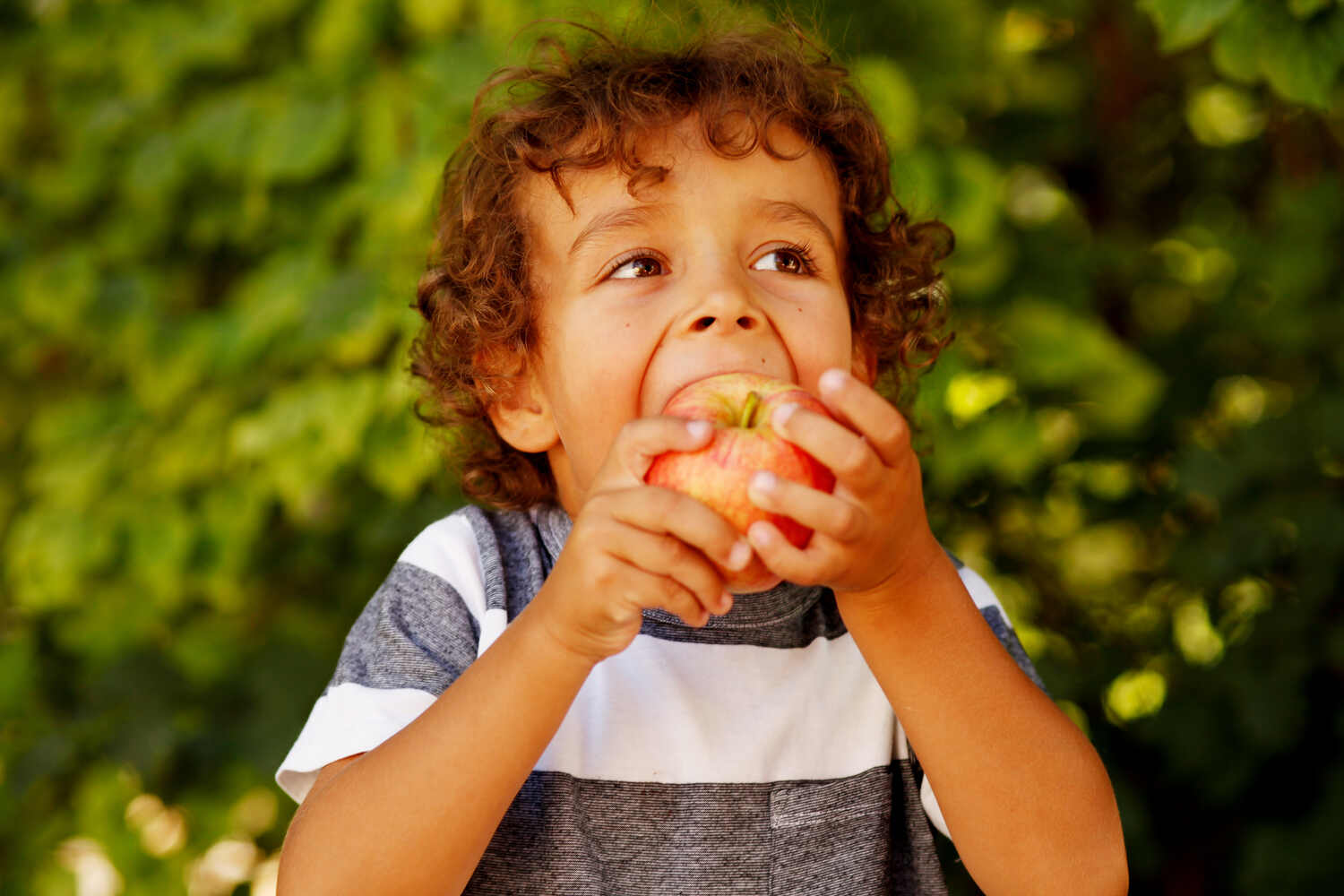
Are you worried about your child’s obsession with sweets? Do you often find yourself trying to hide sweets and chocolates from them? But, if you come to think of it, it’s not actually their fault. As, whenever we consider gifts or treats for kids around us, we often end up buying chocolates or sweet items. We feel the way to a child’s heart is through sweets. However, in our eagerness to make kids happy, we often neglect their health and well-being. And, this social practice is developing sugar addiction in children.
Excessive sugar consumption is unhealthy for a child’s health and development (1). However, all sugar is not bad. It’s the added sugar found in store bought sweets, desserts, and juices etc. which is harmful for the body. So, if your kid has developed a sweet tooth, don’t panic. Read this article to know how you can fight your child’s obsession with sweets and develop healthy eating habits in your children.
In This Article
- Why is Proper Nutrition Important During Childhood?
- Importance of Sugar in a Kid’s Diet
- Recommended Sugar Intake For a Kid
- 5 Reasons Why Children Crave Sugar
- Harmful Effects of Eating Excess Sugar on Children
- 10 Ways to Get Rid of Sugar Addiction in Children
- Does Overeating Sugar Affect Growth in Children?
- Negative Impact of Excessive Sugar Intake on a Child’s Behavior
- FAQ’s
Why is Proper Nutrition Important During Childhood?

Childhood is a stage where a kid grows rapidly. Their physical and mental development requires proper nutrition and a balanced diet. The importance of proper nutrition is discussed below-
Early childhood is the time for rapid growth and development of children.
-
- A balanced diet makes children active and exploring, which is essential for their cognitive development. Additionally, it strengthens the immune system and eliminates the risk of child obesity and chronic diseases (4)
- Children need calcium, iron, protein, and carbohydrates for bone development, overall growth, muscle building, and activity
- Children who get proper nutrition early become mentally and physically healthy
- Also, if from early childhood kids are taught the importance of proper diet, it will set base for them to develop healthy eating habits for life (5)
Importance of Sugar in a Kid’s Diet

Sugar is a simple carbohydrate that quickly breaks down in the body and produces it with energy. It’s the fuel for the brain and other vital organs. Kids who are physically more active often feel low on energy or lethargic. We can offer them sugary foods to meet their energy level or charge them during this time (6).
However, it’s not recommended to provide them with empty sugar. You can offer simple carbohydrates in the form of fruits and dairy products, which also contain essential nutrients that support their nutritional requirements.
Recommended Sugar Intake For a Kid
As per the American Heart Association (AHA) guidelines, children under 2 years should not have any added sugar in their diet. And children above the age of 2 years should consume less than 25 grams of added sugar in a day (7).
5 Reasons Why Children Crave Sugar
Kids really love sugar and sugary foods. A child’s obsession with sweets has various reasons behind it. Some reasons behind why kids like sugar are-
1. Brain Likes Sweet Foods

Humans are intelligent species and know that sweet foods are rich in energy and taste. The primitive man recognized that bitter or sour foods were generally unripe or poisonous for them. They avoided such foods. Hence, the human brain recognizes sweet foods as being safer and healthier. Whenever you eat sweet-tasting food, it triggers the brain’s reward system, and we prefer the repetition of the process (8). Henceforth, the brain obsession or addiction starts toward sugar.
2. Poor Diet

A diet rich in carbohydrates and lacking in protein, fat, and fiber increases sugar cravings. Body breaks down these components for energy, producing glucose that enters the bloodstream. Level of sugar in blood is called blood sugar, which is assessed by the body to know when it needs to eat. While fiber, protein, and fats are complex to break down and take considerable time, carbohydrates are quickly converted to glucose. Once blood sugar levels decrease, it will signal the brain to eat. A diet rich in carbohydrates will make the kid hungry quickly and they will crave for sugary foods.
3. Insufficient Sleep

Irregular sleeping patterns in children can cause appetite hormonal imbalance. As a result, the brain gets the wrong signaling of low energy in the body and seeks immediate high-calorie food for an energy refill (9). This situation can influence children to eat sugary or unhealthy foods.
4. Insufficient Water Intake

Lack of water in the body increases sugar cravings. Water is required for hydration. Insufficient water intake makes the body confused between the hunger and discomfort of dehydration. Hence, kids start eating unhealthy, sugary foods.
5. Nutritional Deficiency

A lack of vitamins and minerals in children’s diets can accelerate their sugar obsession (10). Children suffering from calcium, iron, zinc, and vitamin C deficiency are more prone to develop sugar addiction because of their always-hungry nature.
Harmful Effects of Eating Excess Sugar on Children
If your child overeats sugar daily, then they have excess calories, which will be stored as fat and lead to obesity. Childhood obesity is a concerning factor for their later life. It is associated with hypertension, diabetes, cardiac diseases and many more such diseases. Furthermore, excess sugar intake in children causes tooth decay (11), poor immunity, and indigestion, slowing learning. Sugar in their diet makes kids sluggish, drained, or hyperactive. Therefore, eliminate the excess sugar from your kid’s diet to make them healthy and active.
10 Ways to Get Rid of Sugar Addiction in Children
Here, we will discuss about 10 tips to get rid sugar addiction in children-
1. Develop Healthy Eating Habits

Children always mimic their families. Therefore, if their parents or family are used to healthy food habits, children will automatically understand what they can and cannot do. Healthy eating habits within the family ensure that children avoid unhealthy foods.
2. Offer Healthier Alternatives

You can add dates, honey, or bananas to the dish as natural sweeteners whenever your child craves a sweet taste. It will make them happy and satisfy you as it’s a healthier option than added refined sugar.
3. Stop Sugar at an Early Age

Children below the age of 2 should not be allowed to have added sugar in their diet. It indicates that you can restrict your children’s sugar consumption early. Furthermore, stop giving them sugary foods as gifts or rewards. It will decrease your child’s sugar obsession.
4. Consider Their Food Preferences
Allow your children to decide their food choices. You just need to modify them as healthier options. Do not push them to stop eating sugar immediately, as it can cause more obsession among them.
5. Talk About Sugar’s Impact on Health

Educate them about the negative impact of sugar in their life and encourage them to avoid sugar intake. Incorporate a variety of healthier options in front of them to reduce their craving for sugary items.
6. Encourage Them to Read Food Labels

Teach your kids to read the food label before having it. It will gradually make them responsible for healthy eating habits or think before they consume something.
7. Healthy Snacks Options

Children have less patience when they feel hungry. As a result, they jump to unhealthy food items to satisfy their hunger. In this respect, you are responsible for always making some homemade healthy snacks available for them. If you want to rid your child’s obsession for sweets then provide them with healthy alternatives.
8. Eating With Family

Always encourage the children to sit and eat with the family. Sharing the same meal with parents ensures healthy food habits. It also reduces their addiction towards sugary and junk food.
9. Use Natural Sweeteners

Incorporate natural sweeteners in their diet, like fruits, instead of sugar. It will satisfy their taste buds and reduce the intake of refined sugar.
10. Ensure Proper Nutrition

Sugar carving is also accelerated by dehydration and malnutrition. Ensure that the child is getting enough nutrition through their diet. This will help in curbing your child’s obsession with sweets to an extent.
Does Overeating Sugar Affect Growth in Children?
Sugar is a simple carbohydrate that only provides energy. It has no other nutrients. Growing children require multiple nutrients for their physical and mental growth. Therefore, consuming only sugar food deprives their body of essential nutrients and stunts their growth and development. They can take sugary food occasionally but not in excess amounts. A child’s obsession with sweets and refusal to eat proper food may have adverse effect on their growth.
Negative Impact of Excessive Sugar Intake on a Child’s Behavior

Sugar’s impact on child behavior is a controversial topic. Therefore, animal studies recognized that sugar causes hyperactivity. However, the impact of sugar on human behavior is inconclusive (12).
But it is observed that whenever we feel hungry, our behavior changes. Similarly, children who have a diet with empty sugar and a lack of protein and fiber are always hungry. Thus, they become aggressive, moody, and agitated. On the other hand, sugar increases blood glucose levels in children, which also makes them hyperactive, irritated, and cranky.
Sugar, though an important part of the diet, is not actually good for kids. It should only be consumed in limit. Replace sweet treats and sugary foods with fruits, which are a healthier option. If you are also at your wit’s on how to tackle your child’s obsession with sweets, then the tips listed in this article will come in handy. Inculcating healthy eating habits from an early age ensures a long life without chronic illness for kids.
FAQ’s
1. Is it ok For Kids to Eat Sweets Everyday?
Children above the age of 2 can take sweets in their regular diet. However, excess consumption is not accepted as it can cause multiple health problems like stomach aches, indigestion, and malabsorption of nutrients. Additionally, sugar can reduce the body’s defense mechanism and make children susceptible to infections.
2. What Happens When Kids Overeat Sweets?
Overeating sweets can cause multiple issues like- tooth decay, malnutrition, poor immunity, obesity, diabetes, skin diseases like eczema, learning disability, hyperactivity, cardiac diseases, fatty liver, etc. in kids.
3. Can Too Much Sugar Cause Anger Issues in Kids?
Sugar is responsible for hyperactivity in children, and it influences aggressive behavior to some extent. It can be assumed that high blood sugar levels are associated with aggression or hyperactivity in children, which is sometimes linked with anger (13). Extra sugar rush in children can be dangerous, and causes behavioral changes in them.
4. How Sugar Affects a Child’s Brain?
Excess sugar in the diet can affect learning and memory in kids. Since the brain relies on glucose for its energy needs, consuming too much sugar can put it in a hyper mode. Excess sugar consumption can also, gradually destroy the hippocampus area of the brain, which is responsible for memory and learning-related tasks (14). In addition, sugar also damages other parts of the brain, which affects children’s cognitive development later in life.
References
- Dietary sugar intake among preschool-aged children: a cross-sectional study – [https://www.ncbi.nlm.nih.gov/pmc/articles/PMC8445636/]
- Early nutrition, growth and cognitive development of infants from birth to 2 years in Malaysia: a study protocol – [https://www.ncbi.nlm.nih.gov/pmc/articles/PMC5043613/]
- Sugar for the brain: the role of glucose in physiological and pathological brain function – [https://www.ncbi.nlm.nih.gov/pmc/articles/PMC3900881/]
- The relationship between nutrition and the immune system
– [https://www.ncbi.nlm.nih.gov/pmc/articles/PMC9772031/] - Nutrition education discouraging sugar intake results in higher nutrient density in diets of pre-school children – [https://www.ncbi.nlm.nih.gov/pmc/articles/PMC6760979/]
- The Importance of Sugar in the Diet of the School Child – [https://www.ncbi.nlm.nih.gov/pmc/articles/PMC2183190/pdf/procrsmed00811-0102.pdf]
- Public Policies to Reduce Sugary Drink Consumption in Children and Adolescents – [https://publications.aap.org/pediatrics/article/143/4/e20190282/37217/Public-Policies-to-Reduce-Sugary-Drink-Consumption]
- Reward, dopamine and the control of food intake: implications for obesity – [https://www.ncbi.nlm.nih.gov/pmc/articles/PMC3124340/]
- The effect of mild sleep deprivation on diet and eating behaviour in children: protocol for the Daily Rest, Eating, and Activity Monitoring (DREAM) randomized cross-over trial – [https://www.ncbi.nlm.nih.gov/pmc/articles/PMC6805447/]
- Role of Minerals and Trace Elements in Diabetes and Insulin Resistance – [https://www.ncbi.nlm.nih.gov/pmc/articles/PMC7353202/]
- Sugars and Dental Caries: Evidence for Setting a Recommended Threshold for Intake – [https://www.ncbi.nlm.nih.gov/pmc/articles/PMC4717883/]
- Sugar Addiction: From Evolution to Revolution – [https://www.ncbi.nlm.nih.gov/pmc/articles/PMC6234835/]
- Effects of sugar on aggressive and inattentive behavior in children with attention deficit disorder with hyperactivity and normal children – [https://pubmed.ncbi.nlm.nih.gov/1945637/]
- Sweet but Bitter: Focus on Fructose Impact on Brain Function in Rodent Models – [https://www.ncbi.nlm.nih.gov/pmc/articles/PMC7821920/]
